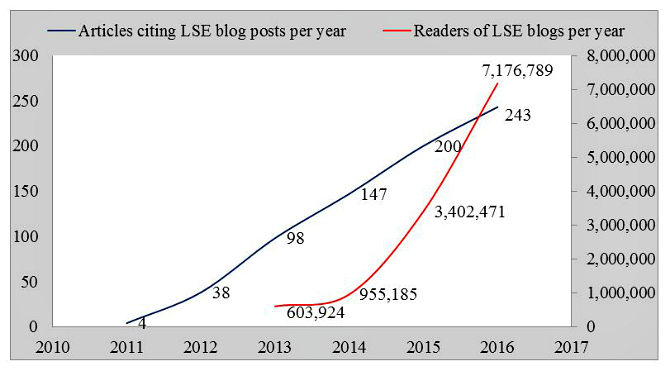 The significance of citations goes far beyond energising and rewarding academic competition. Patrick Dunleavy outlines why citations are so important; from setting up a specialist discourse in an economical and highly-focused manner, guiding readers seeking to follow your extended chain of reasoning, right through to showing you have comprehensively surveyed all relevant work and pointed out its consistencies (or otherwise) with your own findings. A better appreciation of the multiple functions of citations should help to address the chronic under-citation that particularly besets the humanities and social sciences.
The significance of citations goes far beyond energising and rewarding academic competition. Patrick Dunleavy outlines why citations are so important; from setting up a specialist discourse in an economical and highly-focused manner, guiding readers seeking to follow your extended chain of reasoning, right through to showing you have comprehensively surveyed all relevant work and pointed out its consistencies (or otherwise) with your own findings. A better appreciation of the multiple functions of citations should help to address the chronic under-citation that particularly besets the humanities and social sciences.
The sociologist Robert Merton wrote perceptively about citations:
“[T]he institutionalised practice of citations and references in the sphere of learning is not a trivial matter. [Readers] located outside the domain of science and scholarship may regard the lowly footnote or the remote endnote or the bibliographic parenthesis as a dispensable nuisance .. [But] these are in truth central to the [academic] incentive system and an underlying sense of distributive justice, that do much to energise the advancement of knowledge.”
Yet the significance of citations goes far beyond energising and rewarding scientific and academic competition, and for PhDers and early career researchers it is worth briefly enumerating these rationales somewhat more.
All academic research and argument has seven essential characteristics. It is formally stated. Each work contributes to an advanced and specialist conversation. And academic work tackles difficult issues. It forms part of a cumulative and collegial endeavour. Research is evidence-based, and its provenance can always be checked. Research is also demanding and consistent in assessing empirical “facts”. All these features mean that referencing and citing are vital components of academic practice. The decisions that scientists and academics make about including or not including citations to support their arguments play a very important role in conditioning how their colleagues regard and evaluate their work. The table below unpacks a bit further the reasons why citations are so important, set against the seven criteria mentioned above.
| Defining attributes of academic work | What the attribute means | The related role of citations and referencing |
|---|---|---|
| Formally stated | Premises and assumptions are explicit, and arguments are precisely expressed | To specify sources for assumptions and their contextual legitimacy, and to contextualise arguments within a defined field |
| Part of an advanced conversation | Academic work expresses a lot of content in a brief space, using specialist terminology or notations | To set up a specialist discourse in an economical and highly-focused manner, and to show how the relevant literature defines concepts, terms or notations |
| Cumulative | Arguments are built up layer by layer | To show that the author has read the relevant literature and has a good understanding of it |
| Tackling difficult issues | Academic work goes beyond common-sense understandings and (generally) seeks theory-based and non-obvious explanations of complex, hard-to-understand phenomena | To guide readers seeking to follow the author’s extended chain of reasoning. Readers should be able to understand and “replay” the intellectual journey involved |
| Collegial | Professionals carefully accord credit to other authors where it is due. STEM disciplines assign special emphasis to those who are first in discovering or correctly understanding phenomena (primacy) | To accurately assign credit to other researchers for key innovations and relevant prior findings or arguments, so that readers can also access this work for themselves |
| Evidence-based | Arguments are grounded in proofs, recorded facts, or other auditable tokens. The provenance of all claims should be checkable | To allow readers to quickly find and precisely check sources of evidence or other tokens for themselves. An extended version of this criterion, now dominant in more and more STEM and social sciences fields, is that all published work should include a replication archive with data and guidance to make it reproducible |
| Empirically consistent | Evidence and arguments are related to other views or findings, and divergences are explained. In STEM subjects there is a general premium on considering all scientific evidence on the exact same topic, carried through most strongly in “systematic review”. Elsewhere this criterion is often more loosely interpreted | To show that the author has comprehensively surveyed work that is relevant in scope, approach and recency, and to specifically point out consistencies and inconsistencies between other work and the author’s own findings |
Better appreciating the multiple roles of citations should help authors in discipline groups where chronic under-citation is a curiously seductive and hard-to-eradicate form of academic self-harm – the humanities (especially) and many social sciences. It is simply unacceptable scientific or academic behaviour now to ignore immediately relevant research or argument already in the public domain just because it does not help your case, or suit your style of work, or comes from a different discipline.
In the digital era the argument above also makes clear that open access sources should always be the primary reference sources, relegating paywalled sources to secondary status. Linking to OA texts whenever available is consistent with the scientific and academic mission, whereas referencing only paywalled sources is clearly restrictive. Perhaps, as the years pass by, even the authors of the badly out of date style guides still being issued by professional bodies like the APA and MLA will begin to take note.
This blog post originally appeared on the Writing For Research blog and is reposted with permission.
Featured image credit: Citation Needed by Tom Morris (licensed under a CC BY-SA 2.0 license).
Note: This article gives the views of the author, and not the position of the LSE Impact Blog, nor of the London School of Economics. Please review our comments policy if you have any concerns on posting a comment below.
About the author
Patrick Dunleavy is Professor of Political Science and Public Policy at the London School of Economics and Political Science, where he has worked since 1979. He has authored and edited numerous books on political science theory, British politics and urban politics, as well as more than 50 articles in professional journals. He is Chair of the Public Policy Group.








This is a really good summary of what’s important about citations — with one important exception: You open with the statement that “Citations are more than merely assigning credit”. If you’d left “merely” out, I’d be happier.
Credit is very important — especially in today’s world of instantaneous mass communications, where people can rapidly, repeatedly, and freely lift, share, use, alter, and sometimes even claim credit for, the work of original innovators. We all want our work to be shared and used, but without credit, we can lose what is rightfully ours. For those of us whose work has taken years or decades to develop, the consequences are very bad indeed. There is no “merely” about this.
Consider your final words, where you write about the critical importance of open access sources. In this you are spot-on. Open sources really do live or die on attribution; without this, open access will wither away — and academic innovation with it. This is a matter of great personal consequence for me, for I have made my work openly accessible. More than that, like you, I have released it under generous copyright terms by using open content licensing (in my case, as you did, a Creative Commons Public License).
We are far from unique in this regard. We are also far from unique in that before doing these things, we (I will assume “we” rather than just “I”) read extensively and thought deeply about questions of access, primacy, and authorship; and we continue to read extensively and think deeply about these questions today. I cannot afford to do otherwise, and my guess is that you cannot, either.
To be sure, accurate citations are about more than giving credit, but first and foremost is the act of giving credit where credit is due. For me, for other innovators and creators, and for the communities of innovators and researchers who need access to the fullest knowledge-base possible in order to build and expand and contribute, accurate citations — both of original sources, and of the layers of sources that follow — are the bedrock that supports understanding and creation. There is no “merely” about this.
Postscript: It occurs to me that you might not have written the headline with “merely” in it, or that you might have intended it as a legitimate way of emphasizing your focus in the article. It also occurs to me that I jumped all over that word, and that the rest of what you have to say (beginning to the quote from Robert Merton) has no “merely” to it. In this sense, I’m yet another participant in another widespread problem on the internet: Cherry picking and criticizing a word or a sentence, decontextualizing other people’s commets in order to make a point. There is, of course, no “merely” about that, either.
Hi Dave,
Thank you for your comment. I should quickly say, as you have guessed, the titles (and italicised introductions) of our posts are decided by the editor, not the authors. Here, the word “merely” does not actually feature in the main text written by the author.
Thanks again for your comment, I’m glad you enjoyed the post.
Kieran
Great article, will be using in teaching students and staff about referencing. I just wonder what issue Prof. Dunleavy has with APA and MLA? I certainly think that we need to reevaluate referencing styles for the international era, due to the fact the current referencing styles are not suited to the names of researchers in Asia. Furthermore, I think more effective methods of citation could be used in the internet era. Could the author expand on this, or anyone else?